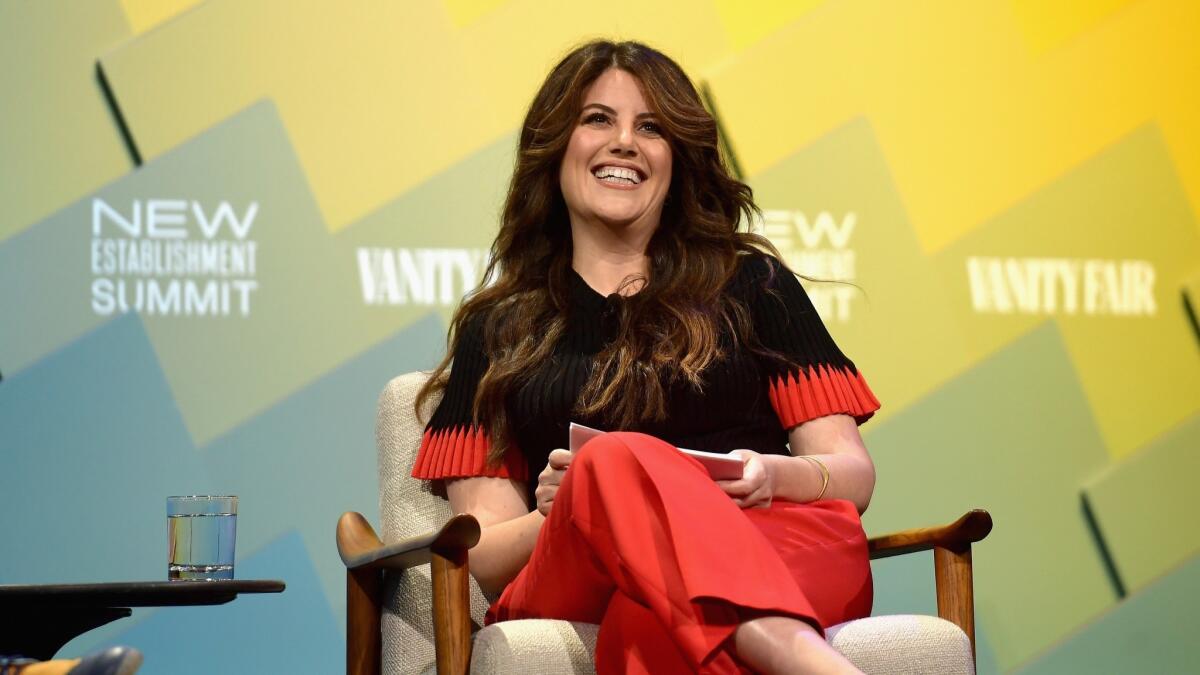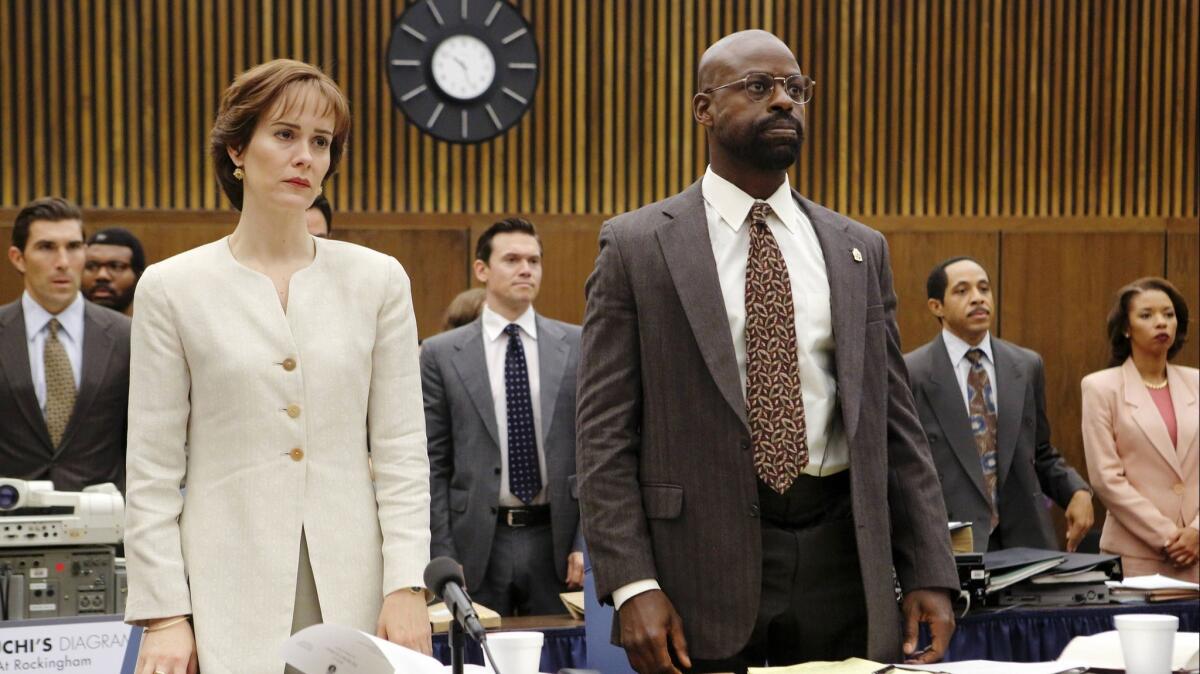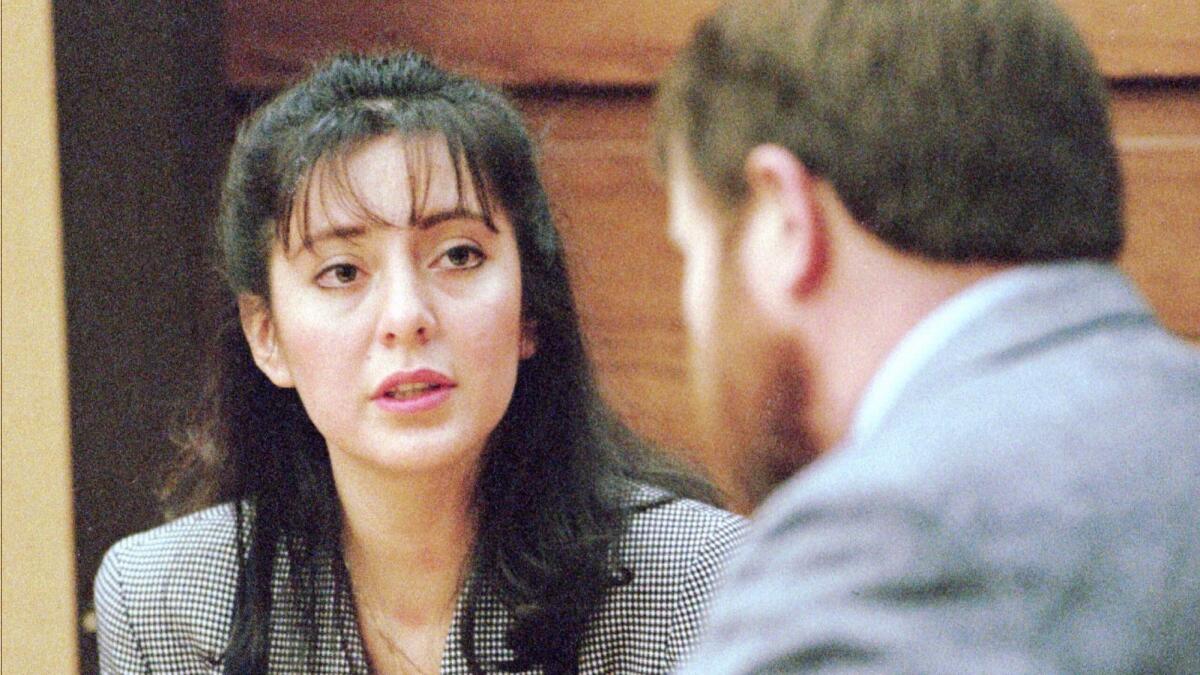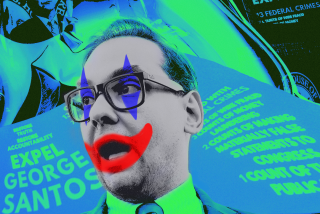Who’s laughing now? Rethinking ‘infamous’ women—Monica Lewinsky, Lorena Bobbitt and our cultural mea culpa

If you were anywhere near a television in 1998, chances are you heard a joke — or a hundred — about Monica Lewinsky. Whether it was David Letterman rattling off the “Top Ten Possible First lines for Lewinsky’s Book” (No. 6: “I knew someday I’d go down in history”) on “The Late Show,” or Molly Shannon as a junk-food-loving Lewinsky on “Saturday Night Live,” the ridicule was ubiquitous — especially after 11 p.m.
Then just 25 and legally bound from speaking up in defense of herself, the former White House intern had been reduced to a beret-wearing caricature by the country’s (overwhelmingly male) political journalists, cable news pundits and late-night personalities.
While the news cycle eventually moved on, Lewinsky languished in what she has called “infamous person prison” for nearly two decades. But she has staged an unlikely comeback that culminated when the Emmy-nominated anti-bullying advocate and Vanity Fair contributor sat recently for a rare interview in “The Clinton Affair,” an A&E docuseries about the impeachment scandal.
While the sordid details of the relationship are nothing new, it is a revelation to hear Lewinsky’s perspective on the “devastating humiliation” of her turn in the media spotlight — especially since, as she notes poignantly, the first time most Americans heard her voice was on the tapes secretly recorded by her supposed friend, Linda Tripp.
In the crosshairs of outrage: Roseanne, Kathy Griffin and now Kevin Hart. Comedy’s shifting red line
The woman once vilified as a “young tramp” by Rep. Charles Rangel, a “little twerp” by Betty Friedan and a “homewrecker” by Bill Maher is now being treated sympathetically — even celebrated — by the culture that gleefully trashed her.
And she’s not alone.
Tonya Harding, Marcia Clark, Lorena Bobbitt, Anita Hill: other women reviled and ridiculed in the 1990s have been recast as unlikely pop culture heroines and seen their lives, once fodder for tawdry tabloid sagas, deemed worthy of prestige TV series and Oscar-baiting biopics.
Donna Rice (now Donna Rice Hughes), who was scorned as a “bimbo” and “sleaze” when she was thrust into the media spotlight slightly earlier than the other women, during Gary Hart’s presidential campaign in 1987, has also seen a recent shift in public perception thanks in part to Jason Reitman’s new film “The Front Runner,” which as Times critic Kenneth Turan wrote, “treats Rice with respect.”
Careless caricatures
The reappraisals began in earnest with Sarah Paulson’s Emmy-winning depiction of Clark in “American Crime Story: The People v. O.J. Simpson.” The acclaimed 2016 miniseries from executive producer Ryan Murphy lionized the prosecutor as a tireless feminist crusader who faced brutally sexist criticism of her looks, personal life and parenting skills.
(Murphy seems to have a soft spot for misunderstood women: he developed a limited series about the Clinton scandal, but has said he decided not to pursue it without Lewinsky’s participation. And this year, in the second installment of his “American Crime Story” anthology, “The Assassination of Gianni Versace,” Penelope Cruz brought some humanity to Donatella Versace, a woman often rendered as a campy cartoon character.)
Onstage at the Emmys, Paulson apologized for being “superficial and careless” in her judgment of Clark who was, she said, “not the two-dimensional cardboard cutout I saw in the news,” but a complicated woman dedicated to “righting an unconscionable wrong.”

Similarly, last year’s Oscar-nominated dark comedy “I, Tonya” reimagined disgraced figure skater Harding as a once-in-a-generation talent from a hardscrabble background whose promising career was derailed by domestic abuse, classism, archaic ideas about female athletes and their bodies. (And, yes, her catastrophically bad judgment.)
“It’s showing a female character who isn’t a victim or a villain or a hero but something else entirely,” said Margot Robbie — who earned Oscar, Golden Globe and SAG nominations for her portrayal of Harding — in an interview with The Times last year. “I think that’s more truthful and reflects more women that I know.”
At January’s Golden Globes, Harding walked the red carpet in a beaded evening gown, posing for pictures with the glamorous Robbie. It represented a stunning turnaround for someone who had been treated, quite literally, as a pop culture punching bag: In 2002, she faced off against Clinton accuser Paula Jones — a woman who endured a similar level of classist scorn in the ’90s — in the infamously sleazy Fox reality show “Celebrity Boxing.”
Like “Monica Lewinsky,” the name Lorena Bobbitt has for many years been synonymous with something done to a penis. But the docuseries “Lorena” may change this perception when it arrives on Amazon early next year. In the four-part investigation, executive produced by Oscar-winner Jordan Peele, director Joshua Rofé revisits the notorious case of Bobbitt, who chopped off her husband’s penis as he slept in what she claimed was an “irresistible impulse” brought about by his repeated rapes and beatings.
The lurid trials that followed were broadcast live on cable, inspiring countless double entendre headlines, juvenile late-night jokes and breathtakingly sexist commentary. Then at the height of his influence, Howard Stern raised money for John Wayne Bobbitt’s medical bills with a New Year’s Eve telethon and once suggested that Lorena couldn’t have been raped by her husband because “she’s not that great-looking. She’s got a lot of pimples.”
“That was a moment where you’re like, my God,” Rofé says of the Stern clip, which he included in the documentary at the insistence of a female editor, Azin Samari. “It was beyond cruel.”

In his telling, Lorena, who participated in the documentary, is not the “crazy knife-wielding lunatic” or fiery Latina stereotype of tabloid fantasy, but a brave survivor who brought attention to the epidemic of domestic abuse — even if the public was less interested in this side of the story. As he reexamined the case, Rofé found that many people even misremembered the basics of Lorena’s biography, recalling her as a middle-aged white women rather than an Ecuadorean immigrant in her mid-20s.
“She was on TV every night. The footage of her clearly having a panic attack was on CNN, was on Court TV, but for some reason, for the very large majority of people, the media, it didn’t penetrate,” he said. “Obviously, things are starting to change.”
But why now?
The collective mea culpa is driven in part by nostalgia. Many of the writers, directors, producers and editors responsible for these reappraisals came of age in the ’90s, “an incredibly prosperous and peaceful time in the U.S.,” said Jeffrey Toobin, who wrote “The Run of His Life: The People v. O.J. Simpson,” the basis of the FX miniseries, as well as a book about the Clinton impeachment. “Perhaps that gave us license to dwell on scandals as opposed to war and peace and economic dislocation. The world looked pretty good.”
Older millennials and young Gen-Xers are naturally interested in revisiting this era and contemplating how it illuminates the current cultural moment; it’s the same impulse that’s brought us shows about the Waco siege, the Unabomber and the Menendez brothers in the past two years.
But what Clark, Bobbitt, Lewinsky and Harding have in common, other than their ’90s infamy, is the gendered nature of the ridicule they faced — about their hair, their looks, their sex lives. And they were all involved, in some way, in stories of abuse. Harding and Bobbitt were allegedly beaten by their husbands; Clark was trying a case against a beloved athlete accused of horrific domestic violence. Lewinsky’s affair with Clinton was consensual, but the power differential between them was vast and her career suffered as a result of the relationship — circumstances widely considered abusive by current standards.
If baby boomers have never gotten over the culture clashes of the 1960s, their children are still fighting a battle of the sexes that ignited in 1991 when law professor Anita Hill accused then-Supreme Court nominee Clarence Thomas of sexual harassment. At the time, Hill was smeared as a “little bit nutty and a little bit slutty,” by journalist David Brock but got the reverential biographical treatment in the 2016 HBO film “Confirmation” (even if the recent showdown between Christine Blasey Ford and Brett M. Kavanaugh felt to many like an unwelcome reboot of the Thomas-Hill controversy).
We are now more likely to take allegations — and the women who make them — seriously.
“The ’90s was an era where men were automatically believed and women were automatically questioned,” says “The Clinton Affair” director Blair Foster. “I think we’re starting to reexamine the way that we think about these things. It’s a little shocking to go back. It seems so fresh and so far away at the same time.”
Pivotal stand-up
The reckoning that began in 1991 entered a revolutionary new chapter with, appropriately enough, a joke. In 2014, Hannibal Buress brought up the long-ignored rape charges against Bill Cosby in a stand-up set that was recorded and widely shared online.
Four years later, the man once known as America’s Dad is now legally classified as a sexually violent predator and numerous other powerful men who immeasurably shaped the culture over the past three decades, like Roger Ailes, Bill O’Reilly, Harvey Weinstein, Charlie Rose and Les Moonves, have also been toppled by allegations of misconduct.
This shift has forced us to reassess the heroes and the villains of our stories, both real and fictional, and to reconsider touchstones from “Sixteen Candles” to “Mad Men” as potential #problematicfavorites. It has encouraged us to see the value in stories that were once dismissed as “soap operas” because they involved the private lives of women. It has demanded that we question who ends up the butt of the joke and why, that we recognize — and in some cases, reject — the power structures undergirding these narratives.
And while formerly disgraced men seem to rebound with relative ease — George W. Bush nearly made Americans forget the Iraq war, Katrina and the economic crisis by passing Michelle Obama a cough drop — women are more likely to be “discovered” because they’re so often left out of history. (See the box-office hit “Hidden Figures,” or the New York Times’ series of obituaries on remarkable, overlooked women.)
Redemption is harder to find if you’re a woman. As a newscaster notes matter-of-factly in “The Clinton Affair,” “men in sex scandals often get second chances, women rarely do.”
“Clinton is always allowed to be portrayed in this dimensional, nuanced way and he can be this flawed character. I wanted to bring that to Monica,” says Foster. “She’s very open and honest about the mistakes she made, but what she suffered is very disproportionate to what the ‘crime’ was.”
Comedian Hannah Gadsby sparked a heated cultural debate this year with her indignant stand-up special and critique “Nanette,” arguing provocatively that comedy often comes at the expense of the already marginalized.
Noting how Lewinsky used to be “an easy punchline,” she draws a direct line between Clinton’s affair and his wife’s electoral loss: “Perhaps if comedians had done their job properly and made fun of the man who abused his power, then perhaps we might have a middle-aged woman with an appropriate amount of experience in the White House.”
She may have a point. Researchers at George Mason University found that Lewinsky was the seventh most frequent target of political jokes on “The Tonight Show” during Jay Leno’s 22-year tenure as host. (By comparison, Osama bin Laden was a distant No. 20.)
“Saturday Night Live” also had a lot of fun at Lewinsky’s expense. At the time of the impeachment scandal, director Adam McKay (“Vice,” “The Big Short”) was co-head writer on the sketch show. He says that while they did plenty of sketches portraying Clinton “as a hornball and a creepy guy, my one regret is there might have been an extra level of outrage.”
McKay recalled writing a sketch that was eventually cut after dress rehearsal: Dr. Monica Lewinsky is a guest on a talk show decades in the future and, even though she’s a Nobel prize-winner with three PhDs, “all the hosts really want to talk about is the cigar and the dress.” McKay can’t remember why it was cut but, he says, “clearly there was some awareness that this is probably going to haunt this poor girl for years, which seems kind of ridiculous given that it should haunt Bill Clinton.”
For years, this prediction was borne out. Lewinsky made early attempts to capitalize on her notoriety, starting a handbag line and hosting a dating show. She tried to revamp her image with a 2002 HBO documentary, only to have an audience member use a crass phrase to suggest that she was defined by her sexual relationship with Clinton. In her time away from the limelight, she earned a master’s degree from the London School of Economics — impressive, if not quite the three PhDs of McKay’s imagination — but was unable to find steady employment because of her past.
Lewinsky made her first step back into the spotlight with a Vanity Fair essay about “the culture of humiliation” in 2014 that prompted Maher and Letterman to express regret over the jokes they told at her expense. Soon after, she began working with publicist Dini von Mueffling in a bid to return to public life, giving a well-received TED talk about “the price of shame” and launching popular anti-bullying campaigns on social media.
Bill Clinton may continue to deny he owes “that woman” an apology but, increasingly, the culture appears to disagree.
Says Von Mueffling, “We’ve changed the narrative.”
ALSO:
Marcia Clark, former O.J. prosecutor, leaves her trials behind and becomes a career-woman role model
‘I, Tonya’ explores the humanity and hard landings of the former figure skater
‘Confirmation’ on HBO is as powerful as Anita Hill’s testimony was 25 years ago
Bill Cosby in handcuffs, Brett Kavanaugh questioned: Why this is more than a #MeToo moment
SAG Awards seize Time’s Up moment with all-female presenters and wins that defy Hollywood ageism
See the most-read stories in Entertainment this hour »
Follow me @MeredithBlake
More to Read
The complete guide to home viewing
Get Screen Gab for everything about the TV shows and streaming movies everyone’s talking about.
You may occasionally receive promotional content from the Los Angeles Times.





